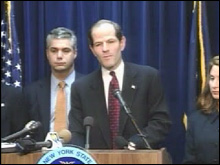
NEW YORK (CNN/Money) -
Merrill Lynch & Co. and New York State Attorney General Eliot Spitzer have settled the conflict-of-interest case against the nation's biggest brokerage house, the two sides said Tuesday.
Spitzer said the settlement should "send a message" to every brokerage house on Wall Street, recommending to firms that they review e-mails and documents and "come in and have some forthright discussions with us."
As part of the settlement, Merrill Lynch will pay $100 million in fines, but will not admit any wrongdoing. Of the $100 million, $48 million will to go New York, while $52 million will go to all other states.
Merrill said it will also separate how analysts are paid from the firm's investment banking business, a goal "to be achieved through a number of new policies." The firm said analysts "will be compensated for only those activities and services intended to benefit Merrill Lynch's investor clients."
At a press conference, Spitzer said analyst compensation would now be based on the performance of stocks in relation to the analysts' recommendations.
"Our objective from the start has been to reinforce investor confidence in the way securities analysts conduct their research and make investment recommendations," Merrill CEO David Komansky and President Stan O'Neal said in a joint statement. "The actions we are taking will ensure that analysts are compensated only for activities intended to benefit investors. We believe this establishes a new industry standard for independence and objectivity of research."
Spitzer sued Merrill last month, alleging that the brokerage firm's research analysts gave more favorable stock ratings to companies that used Merrill to raise money by selling their stock and bonds to the public.
Spitzer said the agreement "provides real reform" by "separating the direct link between research and banking that has tainted investor advice."

| |
|
New York Attorney General Eliot Spitzer (above) announced the Merrill settlement in a news conference.
|
|
But he stressed his investigations are not over and advised every other major Wall Street brokerage house to look at the settlement and ask, "Can we live up to that?"
"Until these reforms become an industry standard we will not have reformed the entire industry," he said. "That is what we intend to do."
Less than an hour after Spitzer's comments, Goldman Sachs announced changes to its research analyst policies, including a review of compensation and the creation of a research ombudsman position.
Komansky told Lou Dobbs Moneyline Tuesday night he feels Wall Street is "in a period of discovery that will certainly create a more holistic environment for investors."
Merrill (MER: up $0.47 to $43.85, Research, Estimates) shares finished higher Tuesday, initially taking other financial stocks with them before a broader market decline later in the day.
E-mails from Blodget, others cited
The attorney general released e-mails showing Merrill analysts -- including former star analyst and Internet guru Henry Blodget -- privately disparaging stocks that publicly got high ratings from the New York-based firm. The attorney general said the evidence indicated that the analysts were heavily influenced by Merrill's banking relationships with companies the firm covered.
Merrill also said it would create a Research Recommendation Committee to review all changes of stock ratings for objectivity, and appoint a "compliance monitor," approved by Spitzer, for one year to ensure the firm abides by the settlement. It will also install a new system to monitor electronic communications between investment bankers and research analysts.
Merrill also apologized again Tuesday, after Komansky did so late last month. The firm said the e-mails cited in Spitzer's lawsuit failed "to meet the high standards that are our tradition and will not be tolerated."
| 
| |

| 
| 
|

|
 New York State Attorney General, Eliot Spitzer, discusses Merrill Lynch settlement. New York State Attorney General, Eliot Spitzer, discusses Merrill Lynch settlement.
|
|
 Play video
Play video
|
| 
|

|
|
At a press conference Komansky said the firm will try hard to re-establish its reputation, but noted the changes may give Merrill a competitive advantage over other brokerage firms.
"It places us in a position where our structure is the most rigorous," he said.
Henry Hu, securities and corporate law professor at the University of Texas, said that at first look the key point is Merrill not admitting any wrongdoing.
"That was the big enchilada Merrill really wanted to avoid," Hu said.
He added that the specter of Spitzer filing criminal charges has also been lifted. Auditor Arthur Andersen lost a substantial amount of its business after the Department of Justice charged it with obstruction of justice in relation to the bankruptcy of energy company Enron Corp.
Hu said any admission of wrongdoing could have been used in future arbitration cases by individual shareholders who claimed they lost money because of Merrill's actions.
But he said Merrill's apology, and admission that some communications violated internal policies, will be helpful to plaintiffs.
Restitution up to individual suits
Spitzer said last week he would not require Merrill to pay any restitution to investors, saying individual lawsuits would be the best way for investors to recover any claimed losses.
At the press conference, Spitzer said class-action lawsuits will continue to go forward, with Merrill facing a potential payout of several billion dollars.
Click here for the settlement text at FindLaw (requires Adobe Acrobat)
Komansky said the attorney general was relying on "somebody else's estimate."
O'Neal said the firm still believes that it will prevail in the class-action lawsuits and that the integrity of its research was always maintained, even in the case of the stocks referred to in the e-mails from the Internet group.
According to Merrill, both the $48 million payment to New York and the $52 million payment to the other states must be approved by all other states.
The North American Securities Administrators Association (NASAA), which is spearheading the multi-state task force investigating Wall Street brokerage firms, said it will be recommending the states sign off on the agreement.
The changes Merrill will implement are in addition to provisions for further disclosure about its banking relationships that the company agreed to in April and also go further than new rules for disclosure adopted by the Securities and Exchange Commission on May 8.
"The terms of the settlement ... align the interests of research analysts with those of investors, without precluding additional rulemaking if needed," said Annette Nazareth, SEC director of market regulation, in a statement.

|

